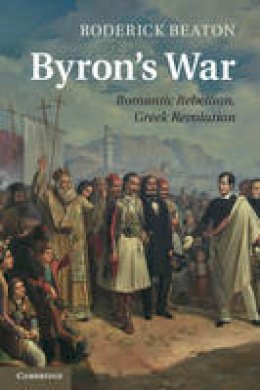
Stock image for illustration purposes only - book cover, edition or condition may vary.
Byron's War: Romantic Rebellion, Greek Revolution
Roderick Beaton
€ 31.36
FREE Delivery in Ireland
Description for Byron's War: Romantic Rebellion, Greek Revolution
Paperback. .
Roderick Beaton re-examines Lord Byron's life and writing through the long trajectory of his relationship with Greece. Beginning with the poet's youthful travels in 1809–1811, Beaton traces his years of fame in London and self-imposed exile in Italy, that culminated in the decision to devote himself to the cause of Greek independence. Then comes Byron's dramatic self-transformation, while in Cephalonia, from Romantic rebel to 'new statesman', subordinating himself for the first time to a defined, political cause, in order to begin laying the foundations, during his 'hundred days' at Missolonghi, for a new kind of polity in Europe – that of the nation-state as we know it today. Byron's War draws extensively on Greek historical sources and other unpublished documents to tell an individual story that also offers a new understanding of the significance that Greece had for Byron, and of Byron's contribution to the origin of the present-day Greek state.
Product Details
Publisher
Cambridge University Press
Format
Paperback
Publication date
2014
Condition
New
Weight
593g
Number of Pages
356
Place of Publication
Cambridge, United Kingdom
ISBN
9781107470385
SKU
V9781107470385
Shipping Time
Usually ships in 4 to 8 working days
Ref
99-1
About Roderick Beaton
Roderick Beaton is Koraes Professor of Modern Greek and Byzantine History, Language and Literature in the Centre for Hellenic Studies at King's College London.
Reviews for Byron's War: Romantic Rebellion, Greek Revolution
'This is rigorous, scrupulous, academic history.' The Spectator '[A] great achievement …' Times Higher Education Supplement '[This] work, about Byron and his contribution to the Greek insurgency … is the first to draw deeply on Greek as well as British sources. As a biographer of George Seferis, the Greek poet and Nobel Laureate, Mr Beaton is well placed to plunge into Athenian historiographical debates and the broader Hellenic search for self-understanding … a formidable array of detail …' The Economist 'Indispensable …' Literary Review 'Military historians interested in Byron will benefit greatly from Beaton's book.' Military History 'A very nearly perfect scholarly publication, the sort of work that simultaneously makes other critics glad it finally exists and angry that they didn't write it themselves … Throughout [Beaton] is a marvellous writer, gripping and evocative while also scrupulously scholarly, and in this way, too, his book is a model particularly for academic writers.' Times Literary Supplement 'Byron's War is a superb portrait of a complex personality. Drawing upon new archival research into the bitter civil wars between rival revolutionary factions, Beaton has constructed a gripping narrative of Byron's self-transformation from Philhellene to a pragmatic and courageous politicker. Far from playing at soldiers or sentimentalising the klephts, Byron was a moderniser and internationalist who saw the Greek revolution as a crucible whose future constitution might inspire the transformation of Europe.' Caroline Franklin, Swansea University 'There is nothing else like this book, for Beaton stands alone in his knowledge not just of the English and Greek sources, but also the English and Greek contemporary context. Byron's War changes our understanding of what Byron was trying to do in Greece, and will be the starting point for all subsequent discussions of the topic.' David Roessel, Richard Stockton College of New Jersey 'Byron's War is a fascinating and essential read for any further work on Byron, but it is also a stellar example about how our understanding of nineteenth-century Britain's engagement with 'the east' and 'the south' can be truly transformed - neither a fantasy, nor a one-way street.' Adela Pinch, SEL Studies in English Literature 1500–1900 '… occasionally a new book comes along that shakes the kaleidoscope and allows us to see him and parts of his life in a new way. Roderick Beaton's book is one such … it is the merit of the book that it raises big questions that will be argued over, and changes the terms on which they will be approached.' The Anglo-Hellenic Review
